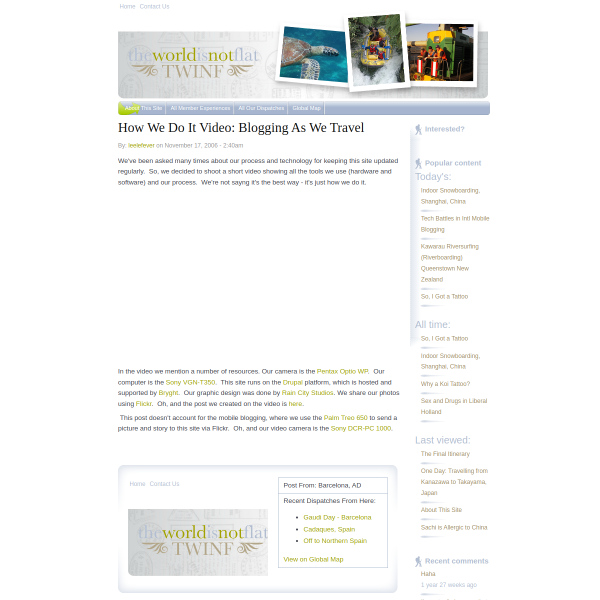What Should I Do With sillygwailo.*.com?
Posted by Richard on Tuesday, 19 December 2006I have a Vox site, a LiveJournal site, and a WordPress.com site at sillygwailo.vox.com, sillygwailo.livejournal.com, and sillygwailo.wordpress.com, respectively. The Vox site where I used to make brief quips, when I should really use it for more community-like things; the LiveJournal site I use for writing a private journal to my LJ friends; and the WordPress.com site I used for cynical search engine optimization experiments, though I'm thinking of using it something else (see below). I'd like to continue using all three, but two of them suffer from the same limitation that doesn't affect the LiveJournal site: on Vox and WP.com you can't post without a title and reliably get a nice permalink. Both WP.com and Vox require titles, while LJ does not. With WP.com technically you can, but in the themes I've tried, the permanent link doesn't appear on the front page. For those that don't actually read blog posts but look at tables, here are the services broken down:
| Service | Requires Titles | Permalinks For Posts With No Title | Domain Pointing |
|---|---|---|---|
| Vox | Yes | N/A (title required, though they suggest some if you don't add one yourself; permanent links based on the title, using underscores, shudder) | No? |
| LiveJournal | No | Yes (all permanent links have the post ID as the 'slug') | Yes |
| WordPress.com | No | No (it makes permanent links, using the post ID as the 'slug', but they don't show on the front page) | Yes |
| Drupal/Bryght | Yes | Sort of. | Yes* |
(I totally snuck "Drupal/Bryght" in there since the company I work for offers a Drupal-powered hosted service and I made sure I snagged sillygwailo.bryght.net while it was available. You can fake permanent links in the theme, and I have an asterisk * with the domain pointing column since you would have to 'rename' the site to a domain, effectively losing the .bryght.net suffix.)
So what should I do with the sites that aren't sillygwailo.livejournal.com? Because I have them, I'm morally obligated to do something with them. sillygwailo.wordpress.com is the best candidate for a "Richard asks questions he's too lazy to research himself", and Vox seems to have more community features built-in than the others, other than LJ, which I use for private stuff. Domain pointing is nice, but not really necessary for me, at least not now. (Though I understand the importance of domain pointing, in that it gives you flexibility if, for whatever reason, you want to change services so that you don't have to change URLs. Flickr, I'm looking in your direction.) Is there a service like LJ—that, y'know, isn't LJ—that gives me a subdomain, has permalinks on the front page but doesn't require a title for each post?








That's a good shot of Boris.
He does look rather dashing, doesn't he.
very saucy
The above comments will not display in the recently updated section because they are syndicated directly from the Flickr photo.